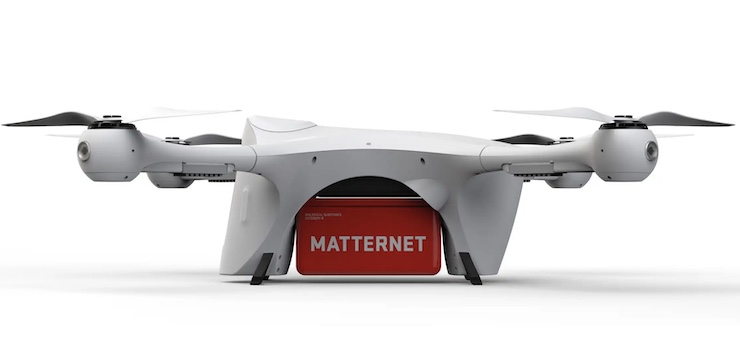
Matternet’s M2 cargo delivery drone was the first in the nation to receive a FAA Type Certificate in September 2022, followed closely by a Production Certificate in November 2022. Last week, the Mountain View, CA-based drone company scored another regulatory victory when the FAA issued the company its second Type Certificate, this time for a revised version of the M2.
The updated M2 includes improvements to the prototype’s software and hardware to further streamline its design and to increase its fuel efficiency and conformity with existing fuel exhaust and noise emission standards.
The updated prototype is already in production and could be rolled out and ready for consumer use sometime next year.
“We are thrilled with the FAA’s decision to grant this amendment, the first-ever to a UAS Type Certification,” Andreas Raptopoulos, founder and CEO of Matternet, told the trade magazine Drone Life last week. “As we develop more advanced technology, it’s very important that we are able to move quickly through the FAA Type Certification process, the gold standard in airworthiness certification.”
Other leading drone companies, including Zipline and Wing, have recently received FAA airworthiness certificates allowing them to continue to develop their prototypes. But none has received a Type or Production certificate allowing them to proceed with manufacturing toward full-scale commercialization.
Matternet is also the first of the major drone companies to develop a scalable model for drone deliveries in both urban and suburban settings in a major European country. Last December, the company announced it had begun test operations on a 5-kilometer Beyond Visual Line of Sight (BVLOS) delivery route over the city of Zurich, Switzerland. The route will be used to transport diagnostic samples between the Triemli and Waid Hospitals – both a part of Stadspital Zürich, a municipal central hospital owned by the city of Zurich.
Matternet officials claim the new system will greatly reduce road congestion on Zurich roads and will also ensure that lab samples arrive promptly without the risk of spoiling due to delivery delays. The company’s M2 drones will operate autonomously but will be monitored visually through Matternet’s Mission Control center in Zurich.
Matternet’s cargo delivery model is uniquely tailored to dense urban environments. In the past, Zipline has deployed fixed-wing aircraft that fly over destination zones and release their cargo with a parachute, a model befitting remote rural villages. Wing has used quadcopters that hover over suburban residential properties and slowly lower their cargo to the ground with a cable.
By contrast, Matternet delivers cargo to pre-positioned parcel containers in public spaces that multiple customers can access with a passcode. Alternatively, the cargo can be picked up by couriers and subsequently delivered to individual homes.
In the current on-demand operation in Zurich, Matternet has established a special delivery system that allows hospitals to order and receive samples on an urgent basis with a secure chain-of-custody. Only designated medical personnel can package and receive the lab samples at each hospital location.
Earlier this year Matternet partnered with Ameriflught to begin urgent deliveries of samples to laboratories and pharmaceuticals to tens of thousands of Ameriflight patients in cities across the United States. It was Matternet’s second major US partnership following on the heels of the company’s collaboration with UPS Flight Forward, the drone subsidiary owned by the United Parcel Service.
|